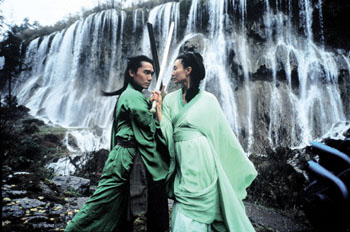![[Metroactive Movies]](/movies/gifs/movies468.gif)
[ Movies Index | Show Times | Silicon Valley | Metroactive Home | Archives ]

Warrior Class: Tony Leung and Maggie Cheung square off in 'Hero.' The Tao Of Power Zhang Yimou's epic 'Hero' teaches a lesson about the mortality of emperors WHO NEEDS church when you have the movies? The obvious example is The Passion of the Christ, coming to DVD Aug. 31. The local art-house hit Spring, Summer, Fall, Winter ... and Spring was practically "Buddhism for Dummies." And Zhang Yimou's Hero from 2002 is one of the finest cinematic expressions of Taoism ever. The film is at last rolled out for American audiences, with an endorsement from Quentin Tarantino, whose Kill Bill movies are amusing but nihilist pastiches of Zhang's work. The film's roots lie in Hong Kong action cinema, but this sumptuously illustrated lesson in the Tao (meaning "the way") is its own kind of movie. Lao Tzu's 2,000-year-old book Tao Teh Ching summarizes the relations of the powerful to the weak, of the intangible to the tangible. Hero is so big it's worth doing a little extra research, to call the theaters to make sure you're seeing it on the widest screen available. Gargantuan as it is, Hero hangs on a delicate point, explaining something I hadn't really understood before. Now I see why Chinese filmmakers return, again and again, to the story of their legendary first emperor and the assassin out to get him. The story is a parable of the essential weakness of the powerful, like the European legend of the king who bade his adviser to tell him three times a day, "Remember, king, thou art mortal." In the time before recorded history, China's first all-powerful emperor has waged total war to unite his nation. He waits for the arrival of a man-with-no-name warrior (Jet Li), who brings him great news: the two assassins the emperor dreaded most, Broken Sword (Tony Leung) and Flying Snow (Maggie Cheung), are vanquished. Zhang imagines the throne room of the first emperor as an altar surrounded with rows and rows of votive candles. Visitors are only allowed to come within 100 paces. No Name begins telling the story of his battles in flashback. And it is at about this time that seasoned moviegoers realize that the emperor has made a big mistake: he's let Death into his palace. In flashbacks, we see how Flying Snow and Broken Sword were romantically linked, so much so that it would have been almost impossible to kill one without killing the other. Maggie Cheung, who plays Flying Snow, has the kind of beauty that isn't staled even by films that are really about her beauty and almost nothing else, like Wong Kar-Wai's In the Mood for Love or Assayas' Irma Vep. She's introduced here, disheveled in a peach-red kimono, her hair over her face, having her tea out of a small jade bowl; the scene recalls the most gorgeously besotted uses of color in Michael Powell movies. No Name, Flying Snow and Broken Sword fight, but their real battlefield is the question of whether or not the emperor must die for his crimes. In the interim, Zhang shows the study of calligraphy as the recreation of swordsmen; the duelists practice on a pad of sand that's wiped clean, like an ancient Chinese Etch A Sketch. Hero is another one of those admirable movies that uses digital animation as a spice, not a meal. And Zhang contrasts the close-up of the flights and flashing swords with the widest shots since Sergio Leone's Westerns: deserts vast as Death Valley, courtyards the size of airport runways, filled with thousands of plumed knights in black armor and forests of flying arrows. This is a classic, but it's an end-of-the-line classic. Any bigger, and the figures would get completely lost; they'd look like mice dueling with toothpicks on a pool table. Zhang has taken the martial arts epic to its most basic level, as a war between primary colors. Sometimes art students say something lethal when they see a painting that's too pretty for them: "It's decorative." Hero might be open to the criticism when it loads the screen with shocking pink silks and whirling golden leaves. What keeps it from being glutting is its essential, almost totalitarian, simplicity. An example is the brutal redness of a single ideograph on a billboard-sized scroll: a present to the emperor, a barbed lesson to him in statecraft. The down side of Taoism as a political philosophy is that it can endorse complacency. Reminding an emperor of his sacred duty never to draw the sword unnecessarily isn't really enough: it doesn't pluck the sword from the emperor's hand. Still: "He who knows how to guide a ruler in the path of the Tao/ Does not try to override the world with the force of arms/ It is in the nature of a military weapon to turn against its wielder"—Lao Tzu. A lesson for presidents as well as emperors.
Hero (PG-13; 99 min.), directed by Zhang Yimou, written by Feng Li, Ben Wang and Zhang Yimou, photographed by Christopher Doyle and starring Jet Li, Tony Leung and Maggie Cheung, opens Friday.
Send a letter to the editor about this story to letters@metronews.com. [ Silicon Valley | Metroactive Home | Archives ]
|
From the August 25-31, 2004 issue of Metro, Silicon Valley's Weekly Newspaper.
Copyright © Metro Publishing Inc. Metroactive is affiliated with the Boulevards Network.
For more information about the San Jose/Silicon Valley area, visit sanjose.com.